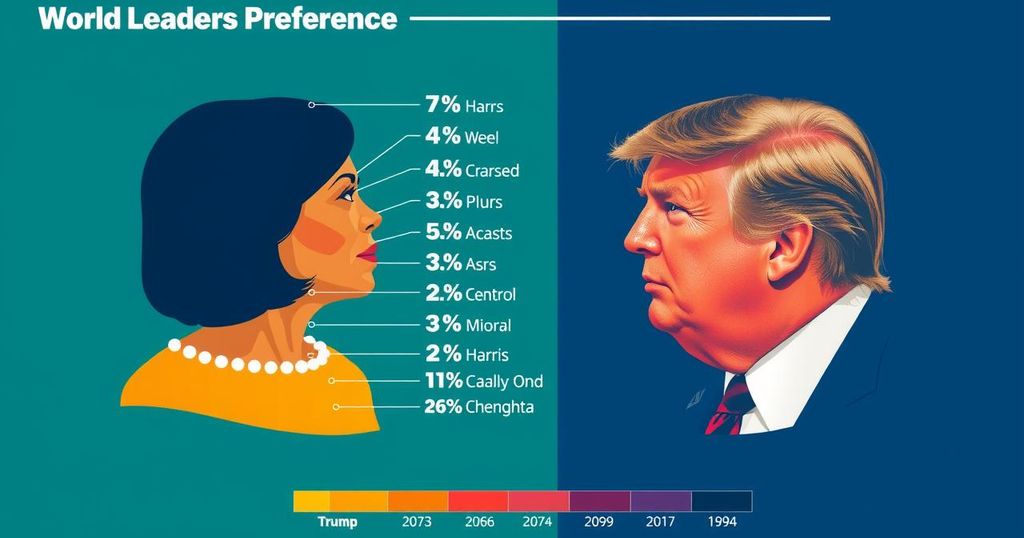World news
2024 PRESIDENTIAL ELECTION, AL JAZEERA, ASH, ASIA, CHATHAM, DONALD TRUMP, ELECTION, EUROPE, EUROPEAN UNION, INDIA, LABOUR PARTY, MEDIA, MOD, NATO, NORTH AMERICA, STATES, TRUMP, U.S. ELECTIONS, UKRAINE, UNITED STATES, US PRESIDENTIAL ELECTION, US PRESIDENTIAL RACE, WHITE HOUSE
Ethan Kim
0 Comments
Global Leaders’ Preferences in the 2024 U.S. Presidential Election: Harris vs. Trump
The impending U.S. presidential election on November 5, 2024, features a closely contested race between Kamala Harris and Donald Trump, drawing significant interest from global leaders. Preferences among various national leaders reveal a preference for Trump by Putin, a cautious stance from Modi, and support for Harris among European leaders. The election’s outcome is anticipated to influence international relations profoundly.
As the United States presidential election approaches on November 5, 2024, the race between Democratic Vice President Kamala Harris and Republican former President Donald Trump remains highly competitive. The outcome of this election does not only bear significance for American citizens but is closely monitored by global leaders due to the United States’ substantial influence on international affairs. World leaders have shown varying preferences regarding the potential winner of this election. Russian President Vladimir Putin has appeared to favor Trump, considering him to maintain a softer stance on Russia, which aligns with Putin’s interests. Analysts suggest that Putin perceives Trump as a reflection of his own authoritarian tendencies and values the chaos Trump could foster in Western institutions. Conversely, Chinese President Xi Jinping has yet to publicly endorse either candidate. Despite both have positioned their policies firmly against China, Harris is perceived to align more closely with international cooperation compared to Trump’s aggressive trade war strategies. Interestingly, some analysts suggest that behind the scenes, China might lean slightly towards Harris. In Israel, Prime Minister Benjamin Netanyahu is believed to prefer Trump, with whom he had a beneficial relationship during Trump’s presidency. However, Netanyahu’s recent efforts to reconnect with Trump indicate his strategic interests amid the current political climate. European leaders have largely expressed support for Harris, with German Chancellor Olaf Scholz stating, “I know her well, she would certainly be a good president.” Indian Prime Minister Narendra Modi appears neutral, maintaining that the United States’ bipartisan support for India remains unchanged regardless of the election result. For South Korea and Japan, both countries appear cautious regarding a potential Trump presidency due to his prior demands for increased defense spending and an unpredictable foreign policy. In Australia, concerns abound regarding Trump’s environmental policies and their potential impact on climate cooperation. In summary, while world leaders exhibit distinct inclinations towards either candidate, the general consensus reflects a cautious standpoint in anticipation of how their choice may shape future diplomatic relations and global policies.
The U.S. presidential election involves complex considerations that extend far beyond the borders of the United States. Global leaders ponder the implications of potential candidates on international relations, economic ties, and geopolitical strategies. As the presidency traditionally entails substantial influence worldwide, understanding leaders’ preferences sheds light on anticipated shifts in foreign policy and global partnerships. This document examines specific countries’ leadership preferences in the context of the tightly contested race between Vice President Kamala Harris and former President Donald Trump, highlighting perspectives from notable figures and analysts.
The preferences of world leaders regarding the U.S. presidential candidates reveal a significant interest in the implications for international relations and global dynamics. Putin seems to favor Trump, viewing his leadership as beneficial to Russian interests, while Harris is regarded favorably among many European leaders and potentially by Xi Jinping. As global contexts continue to evolve, the outcome of the 2024 U.S. presidential election will be pivotal in shaping future diplomatic and economic cooperation on multiple fronts.
Original Source: www.aljazeera.com




Post Comment